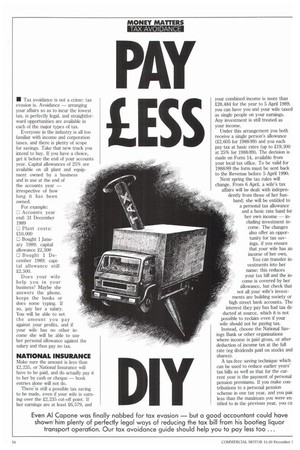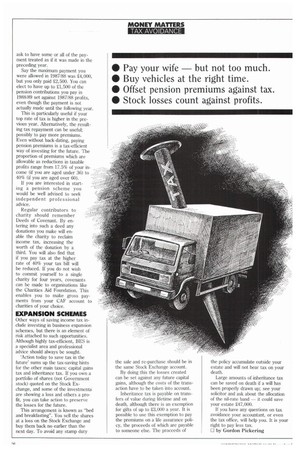PAY
Page 56

Page 58

If you've noticed an error in this article please click here to report it so we can fix it.
• Tax avoidance is not a crime: tax evasion is. Avoidance — arranging your affairs so as to incur the lowest tax, is perfectly legal, and straightforward opportunities are available in each of the major types of tax.
Everyone in the industry is all too familiar with income and corporation taxes, and there is plenty of scope for savings. Take that new truck you intend to buy. If you have a choice, get it before the end of your accounts year. Capital allowances of 25% are available on all plant and equipment owned by a business and in use at the end of the accounts year — irrespective of how long it has been owned.
For example:
1] Accounts year end: 31 December 1989
LI Plant costs: £10,000
IL1 Bought 1 January 1989; capital allowance £2,500 Ll Bought 1 December 1989; capital allowance still £2,500.
Does your wife help you in your business? Maybe she answers the phone, keeps the books or does some typing. If so, pay her a salary. You will be able to set the amount you pay against your profits, and if your wife has no other income she will be able to use her personal allowance against the salary and thus pay no tax.
NATIONAL INSURANCE
Make sure the amount is less than £2,235, or National Insurance will have to be paid, and do actually pay it to her by cash or cheque — book entries alone will not do.
There' isstill a possible tax saving to be made, even if your wife is earning over the £2,235 cut-off point. If her earnings are at least £6,579, and your combined income is more than £28,484 for the year to 5 April 1989, you can have you and your wife taxed as single people on your earnings. Any investment is still treated as your income.
Under this arrangement you both receive a single person's allowance (£2,605 for 1988/89) and you each pay tax at basic rates (up to 219,300 at 25% for 1988/89). The decision is made on Form 14, available from your local tax office. To be valid for 1988/89 the form must be sent back to the Revenue before 5 April 1990.
Next spring the tax rules will change. From 6 April, a wife's tax affairs will be dealt with independently from those of her husband; she will be entitled to a personal tax allowance and a basic rate band for her own income — in cluding investment income. The changes also offer an opportunity for tax savings, if you ensure that your wife has an income of her own. You can transfer investments into her name; this reduces your tax bill and the income is covered by her allowance, but check that not all your wife's investments are building society or high street bank accounts. The interest they pay has had tax de. ducted at source, which it is not possible to reclaim even if your wife should not be paying tax. Instead, choose the National Savings Bank or other organisations where income is paid gross, or after deduction of income tax at the full rate (eg dividends paid on stocks and shares).
A tax-free saving technique which can be used to reduce earlier years' tax bills as well as that for the current year is the payment of personal pension premiums. If you make contributions to a personal pension scheme in one tax year, and you paic less than the maximum you were entitled to in the previous year, you ca ask to have some or all of the payment treated as if it was made in the preceding year.
Say the maximum payment you were allowed in 1987/88 was £4,000, but you only paid £2,500. You can elect to have up to £1,500 of the pension contributions you pay in 1988/89 set against 1987/88 profits, even though the payment is not actually made until the following year.
This is particularly useful if your top rate of tax is higher in the previous year. Alternatively, the resulting tax repayment can be useful; possibly to pay more premiums. Even without back-dating, paying pension premiums is a tax-efficient way of investing for the future. The proportion of premiums which are allowable as reductions in taxable profits range from 17.5% of your income (if you are aged under 36) to ., 40% (if you are aged over 60).
If you are interested in starting a pension scheme you would be well advised to seek independent professional advice_ Regular contributors to charity should remember Deeds of Covenant. By entering into such a deed any donations you make will enable the charity to reclaim income tax, increasing the worth of the donation by a third. You will also find that if you pay tax at the higher rate of 40% your tax bill will be reduced. If you do not wish to commit yourself to a single charity for four years, covenants can be made to organisations like the Charities Aid Foundation. This enables you to make gross payments from your CAF account to charities of your choice.
EXPANSION SCHEMES
Other ways of saving income tax include investing in business expansion schemes, but there is an element of risk attached to such opportunities. Although highly tax-efficient, BES is a specialist area and professional advice should always be sought.
'Action today to save tax in the future' sums up the tax-saving hints for the other main taxes; capital gains tax and inheritance tax. If you own a portfolio of shares (not Government stock) quoted on the Stock Exchange, and some of the investments are showing a loss and others a profit, you can take action to preserve the losses for the future.
This arrangement is known as "bed and breakfasting". You sell the shares at a loss on the Stock Exchange and buy them back no earlier than the next day. To avoid any stamp duty the sale and re-purchase should be in the same Stock Exchange account.
By doing this the losses created can be set against any future capital gains, although the costs of the transaction have to be taken into account.
Inheritance tax is payable on transfers of value during lifetime and on death, although there is an exemption for gifts of up to £3,000 a year. It is possible to use this exemption to pay the premiums on a life assurance policy, the proceeds of which are payable to someone else. The proceeds of the policy accumulate outside your estate and will not bear tax on your death.
Large amounts of inheritance tax can be saved on death if a will has been properly drawn up; see your solicitor and ask about the allocation of the nil-rate band it could save your estate 247,000.
If you have any questions on tax avoidance your accountant, or even the tax office, will help you. It is your right to pay less tax.
0 by Gordon Pickering




































































































